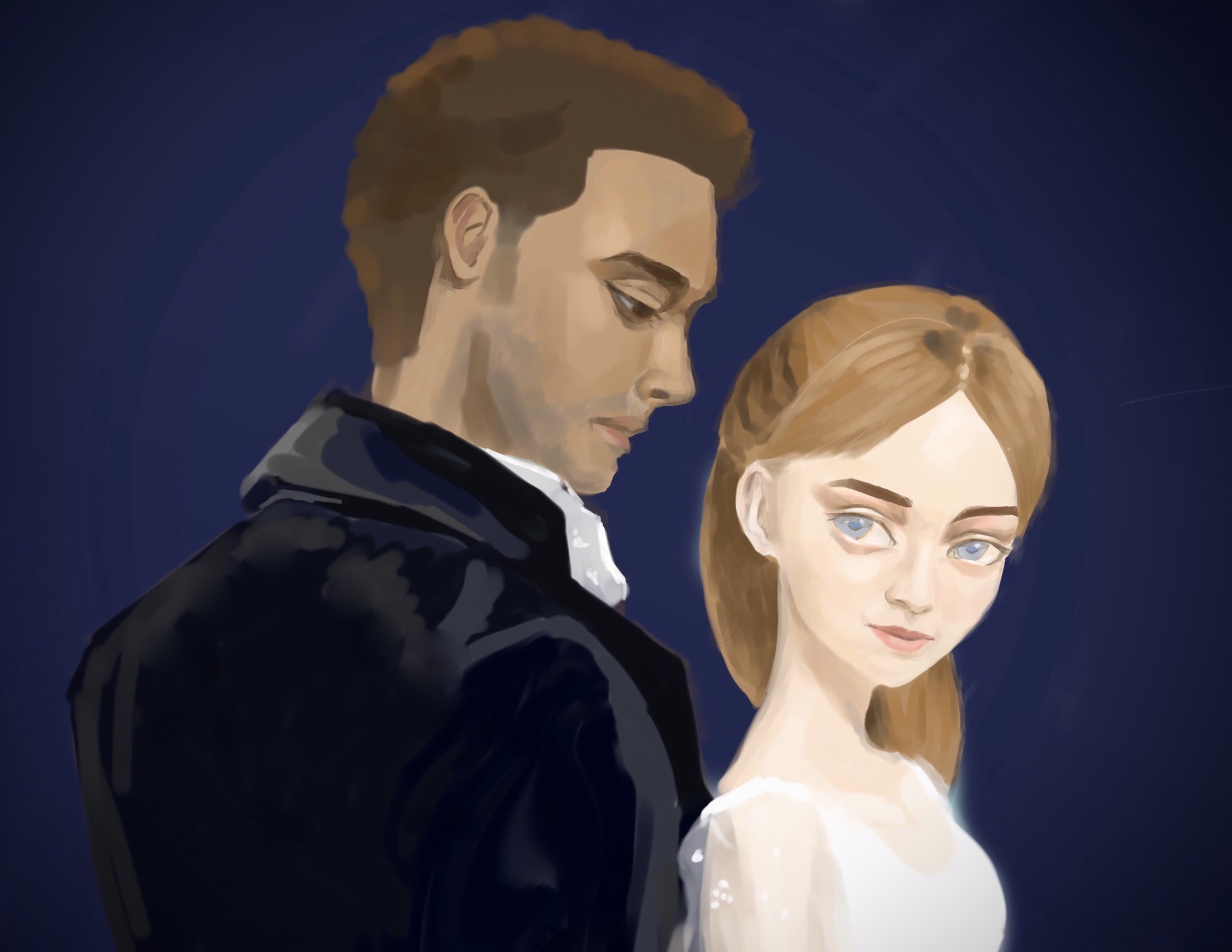
Annie Lin
Contains spoilers for the first season of “Bridgerton.”
Over winter break, as screen time increasingly filled my days, “Bridgerton” appeared on my radar, and I began watching what is perhaps the sauciest period drama to grace Netflix. I began watching the show with my parents, and it only took a few episodes for me to regret making it a family event. Set in 1813 London, “Bridgerton” follows the “coming out,” or social debut, of a young aristocrat named Daphne Bridgerton and her rather complicated — and initially unwilling — romance with Simon Bassett, the duke of Hastings, beginning with their deceptive courtship and culminating in a turbulent new marriage.
To me, the biggest thing that sets “Bridgerton” apart from period dramas of old — think “Pride and Prejudice” or “Jane Eyre” — was its sheer quantity of steamy scenes. Titillating though they were, there is certainly much to be unpacked in the sexual dynamics and relationships in the show, particularly between Daphne and the duke. As far as relationships go, it’s safe to say the one between Daphne and Simon is not the best model for a healthy marriage. I was left confused by the jerky progression of their relationship arc, going from mutually antagonistic in one moment to passionate lovers in the next. Don’t get me wrong — there’s nothing I love more than a good old enemies-to-lovers trope, but it only works when executed smoothly. Unfortunately, I simply felt that “Bridgerton” only got away with its sloppy storyline here because of, well, the amount of salacious scenes that distracted us from actual plot development.
Communication is also lacking between the two main characters. The duke has clear qualms about fatherhood from the start of the show. As the audience is made aware early in the season, Simon’s lack of a relationship with his cold father and the death of his mother during childbirth left him traumatized, causing him to vow to his dying father that he would be the end of the family line. This complicates his relationship with Daphne. By telling his new wife — who has not received any sexual education other than whatever he has explained to her — that he cannot have children, he misleads her into thinking he is physically unable to procreate. Eventually, Daphne figures out that Simon is pulling out to avoid getting her pregnant and fulfilling her lifelong dream of having children. Rather than having an actual conversation with her husband about his perceived deception, Daphne decides to take matters into her own hands.
Having recently watched “I May Destroy You,” the BBC’s critically acclaimed drama about a woman’s life after sexual assault, I was left with many questions about the way Bridgerton handled what was essentially nonconsensual sex. In “I May Destroy You,” the protagonist sleeps with a man who pulls off his condom during intercourse. This leaves her understandably shaken and upset, especially as she comes to terms with the fact that “stealthing” is in fact sexual assault. In “Bridgerton,” Daphne’s refusal to let Simon pull out and forcing him to finish while still inside her against his will is equally troubling. This is particularly jarring because of the way the show completely glosses over this moment, even going so far as to frame Daphne as the victim of Simon’s denial of her wish to have children. The show’s handling of the issue of consent leaves much to be desired, as Daphne and Simon never fully discuss their mutual betrayal of trust. The show superficially ties everything up neatly by the end of season with Daphne giving birth to a baby boy. The montage of a happy family in the season finale leaves a bitter taste in my mouth, as it minimizes her assault of Simon — a rape that isn’t treated like a rape. This disturbs me because men are already routinely sent the message by society that they cannot possibly be the victims of sexual assault; moreover, it is so often Black men who are scapegoated for sexual assault and kept silent when they themselves are victims of it.
Another aspect of “Bridgerton” that I found particularly interesting was the way it chooses to handle race. “Bridgerton” boasts a diverse cast like many newer period dramas, but what sets it apart is the fact that this choice is explicitly acknowledged, albeit briefly. In its fourth episode, Lady Danbury, Simon’s mentor, tells Simon that “We were two separate societies divided by color until a king fell in love with one of us,” making Black aristocrats part of the nobility.
I did take some issue with the escapism pervasive in the world of “Bridgerton.” Rather than recognizing the reality of early 19th-century London, only shortly after the abolition of the British slave trade in 1807, Lady Danbury dismisses any concerns of racial unease with a trite statement: “Love, your grace, conquers all.” This was more than a tad disappointing to me, considering that “Bridgerton” had seemed poised for a moment to actually delve into racial dynamics, but perhaps season two will prove me wrong by fleshing out the histories and backgrounds of the show’s multiracial characters rather than rendering them one-dimensional.
Ultimately, I finished “Bridgerton” with mixed feelings, left uneasy by some of its messages and oversights. Despite that, I’m unable to deny that the escapism and glamour provided by its portrayal of upper-society 1800s London made the last week I spent waiting to return to campus far more bearable. So would I watch a second season of “Bridgerton”? Absolutely. After all, there’s nothing like a guilty pleasure-watch of Regency era smut to get you through a pandemic!
Melissa Adams | melissa.adams@yale.edu







